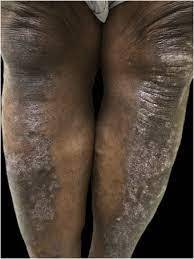Preventing Dermatitis: Strategies, Tips, and Remedies
Introduction:
Dermatitis, commonly known as eczema, is a prevalent skin condition that affects millions of people worldwide. It manifests as red, itchy, and inflamed skin, often accompanied by swelling, dryness, and even blistering in severe cases. While dermatitis can be triggered by various factors such as genetics, allergies, irritants, and environmental conditions, adopting preventive measures can significantly reduce the frequency and severity of outbreaks. In this comprehensive guide, we will explore effective strategies, practical tips, and natural remedies to help you prevent dermatitis and maintain healthy skin.
Understanding Dermatitis:
Before delving into preventive measures, it's essential to understand the different types of dermatitis and their underlying causes. Dermatitis can be classified into several categories, including:
1. Atopic Dermatitis: This is the most common form of dermatitis, often associated with allergies and a family history of eczema, asthma, or hay fever.
2. Contact Dermatitis: It occurs when the skin comes into contact with irritants or allergens, leading to a localized inflammatory response.
3. Seborrheic Dermatitis: Characterized by red, itchy, and flaky skin, seborrheic dermatitis primarily affects areas rich in oil glands, such as the scalp, face, and chest.
4. Nummular Dermatitis: This type of dermatitis presents as coin-shaped patches of irritated skin, usually triggered by dryness, injury, or certain medications.
5. Dyshidrotic Dermatitis: Commonly affecting the hands and feet, dyshidrotic dermatitis is characterized by small blisters that cause intense itching and discomfort.
While the specific triggers and symptoms may vary depending on the type of dermatitis, the overarching goal of prevention remains the same: to minimize exposure to irritants and allergens while maintaining skin health and hydration.
Effective Strategies for Preventing Dermatitis:
1. Identify and Avoid Triggers:
- Keep a journal to track flare-ups and identify potential triggers such as certain foods, skincare products, environmental factors, or stress.
- Avoid known allergens such as pollen, pet dander, dust mites, and certain foods if you have atopic dermatitis.
- Choose hypoallergenic and fragrance-free skincare products to minimize the risk of irritation.
- Opt for natural cleaning products and detergents to reduce exposure to harsh chemicals that can exacerbate dermatitis.
2. Practice Good Skincare:
- Moisturize regularly using emollients and moisturizers to maintain skin hydration and strengthen the skin barrier.
- Take short lukewarm showers or baths using mild, fragrance-free cleansers, and pat your skin dry gently with a soft towel.
- Avoid scrubbing or rubbing your skin vigorously, as this can irritate sensitive skin and exacerbate dermatitis.
- Use a humidifier to add moisture to the air, especially during dry winter months when indoor heating can dry out the skin.
3. Protect Your Skin:
- Wear protective clothing such as gloves, long sleeves, and hats to shield your skin from harsh weather conditions, UV radiation, and potential irritants.
- Apply a broad-spectrum sunscreen with a high SPF to protect your skin from sun damage, which can trigger or worsen dermatitis.
- Use barrier creams or ointments before engaging in activities that may expose your skin to irritants or allergens, such as gardening or household chores.
4. Manage Stress:
- Practice stress-reduction techniques such as deep breathing, meditation, yoga, or tai chi to alleviate emotional stress, which can exacerbate dermatitis.
- Engage in regular physical activity to promote overall well-being and reduce stress levels, but be mindful of excessive sweating, which can trigger flare-ups.
5. Adopt a Healthy Lifestyle:
- Eat a balanced diet rich in fruits, vegetables, lean proteins, and omega-3 fatty acids to support skin health and reduce inflammation.
- Stay hydrated by drinking plenty of water throughout the day to keep your skin hydrated and flush out toxins.
- Avoid smoking and limit alcohol consumption, as both can impair skin barrier function and exacerbate dermatitis.
Natural Remedies for Dermatitis Prevention:
1. Coconut Oil:
- Apply virgin coconut oil topically to moisturize and soothe inflamed skin, thanks to its anti-inflammatory and antimicrobial properties.
2. Aloe Vera:
- Use pure aloe vera gel to calm irritated skin, reduce itching, and promote healing, as it contains compounds that possess anti-inflammatory and moisturizing effects.
3. Oatmeal Baths:
- Add colloidal oatmeal to your bathwater to relieve itching and inflammation associated with dermatitis, as oatmeal contains antioxidants and anti-inflammatory compounds.
4. Calendula:
- Apply calendula cream or ointment to soothe irritated skin and promote healing, as calendula possesses anti-inflammatory, antimicrobial, and wound-healing properties.
5. Chamomile:
- Brew chamomile tea and apply it topically or use chamomile essential oil diluted in a carrier oil to reduce inflammation and soothe sensitive skin.
Conclusion:
Preventing dermatitis requires a multifaceted approach that involves identifying and avoiding triggers, practicing good skincare habits, protecting your skin from environmental stressors, managing stress, and adopting a healthy lifestyle. By incorporating these strategies into your daily routine and incorporating natural remedies when necessary, you can effectively minimize the risk of dermatitis flare-ups and maintain healthy, radiant skin. Remember to consult with a dermatologist if you experience persistent or severe symptoms of dermatitis to receive personalized treatment and guidance tailored to your specific needs.



No comments yet
Be the first to share your thoughts!